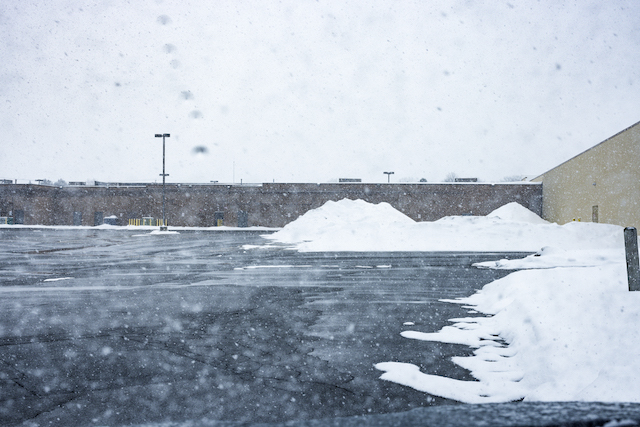How to Protect Your Property’s Concrete from the Cold Weather

Read on to learn how to get your property’s concrete ready to be protected from the cold weather in the coming weeks!
Winter is approaching soon, and with that means snow, hail, and sleet. This means you should take the proper steps to protect your property’s concrete surfaces, like patios, balconies, walkways, and other exposed surfaces outside. Concrete is porous, and this means that it will absorb water readily. Porous materials are damaged more easily during winter freezing thaw cycles than non-porous ones. While concrete is a durable and strong material, it is not resistant to all chemicals and treatments you may apply to keep it both ice and snow-free. Read on to learn how to get your property’s concrete ready to be protected from the cold weather in the coming weeks!
Seal Your Concrete Surfaces Regularly
A simple way you can protect concrete surfaces from possible winter freeze is by applying a sealer to them on a consistent basis. There are two kinds of leading concrete sealers and film-forming acrylic sealers and penetrating sealers. Acrylic sealers dry to form from any weather-resistant film on top of a concrete surface that protects it from water penetration and deicing chemicals you may use during the winter. On the other hand, penetrating sealers won’t create a film on the concrete surface, but it will instead penetrate deep down in your concrete pores to coat the inside with a water-replant substance. These sealers should be applied right before or after winter finally comes. If you want to avoid the use of sealers entirely, consider hiring G&M Services for concrete repair. This helps you avoid fissures and cracks and prevents existing cracks from getting worse during the winter season!
Limit the Use of Any Chemical Deicers
Try to limit the amount of any chemical deicers during the winter and choose them wisely. A couple of deicing chemicals could seriously harm concrete sealers and the concrete surfaces under them, while others can gradually harm the surfaces as time passes. Avoid using deicers that contain ammonium nitrate or ammonium sulfate as well. These can hurt concrete by causing it to disintegrate slowly. Ideally, you shouldn’t cover any slippery concrete with ordinary sand. Sand will not melt your ice, but it does create traction on the ice surface and makes it a lot less slippery and safer for you to walk on. G&M Services can help you with figuring out if any deicers contain harmful chemicals.
Remove Snow Off Your Concrete Consistently
After a snowstorm, you may be tempted to leave some of it on your driveway after you remove just enough to drive your car in and out. However, you should really remove all of the snow from the outdoor concrete after it snows. If you do not want to remove it when temperatures are still below freezing, it could melt once temperatures rise and then cause some possible water damage in your concrete.
Revitalize Your Business with G&M Services
G&M Services is proud of our employees and the dedication they have for safety in the workplace. We reward our employees for displaying positive safety practices. We incorporate weekly and monthly discussions and meetings to ensure that all involved know how to handle equipment and potentially risky situations during a project. We offer services in the way of concrete drilling and sawing, concrete scanning, and Firestop. To get started with us, call today at 410-787-8828 or visit our contact page. Follow the official company page today on Facebook, Twitter, and LinkedIn.








